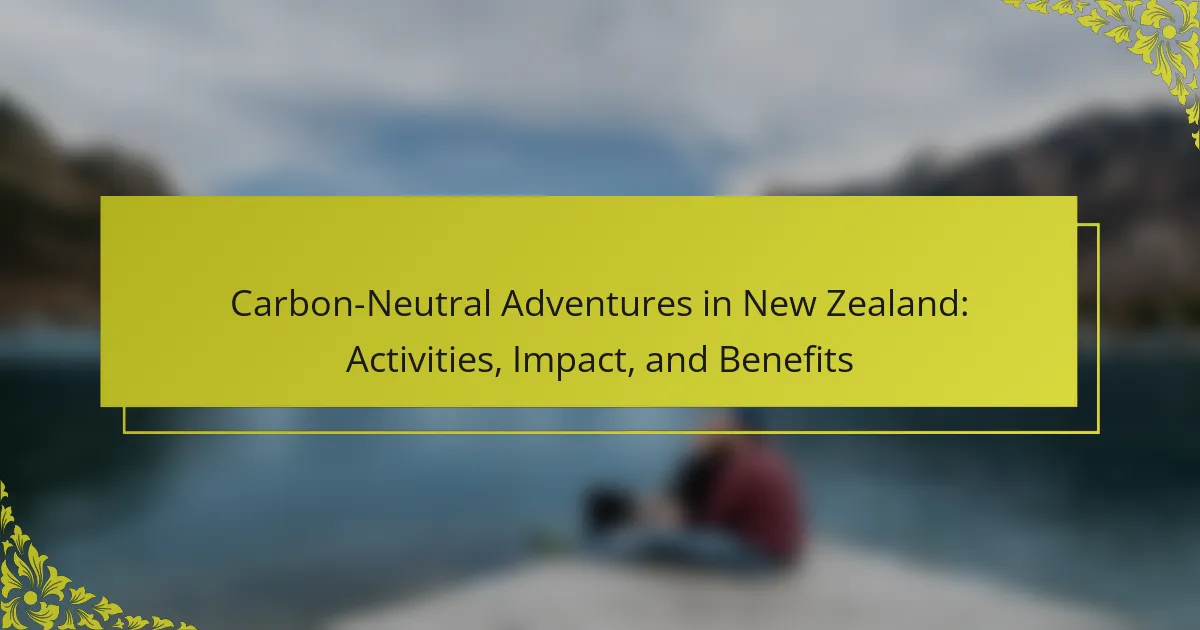Exploring carbon-neutral adventures in New Zealand offers travelers unique experiences while promoting sustainability. This article covers eco-friendly activities, their environmental impact, and economic benefits. Learn how these adventures support local communities and enhance awareness of conservation efforts. Discover ways to ensure your travels are genuinely carbon-neutral through mindful choices and practices.

What are the key carbon-neutral activities available in New Zealand?
New Zealand offers various carbon-neutral activities that promote sustainability and environmental conservation. Examples include eco-friendly hiking tours, wildlife conservation projects, and carbon-offsetting cycling adventures. These activities not only reduce carbon footprints but also enhance awareness of environmental issues. Engaging in these adventures supports local communities and protects natural habitats.
How do eco-tours contribute to carbon neutrality?
Eco-tours contribute to carbon neutrality by promoting sustainable practices and minimizing carbon footprints. These adventures often include activities like tree planting, wildlife conservation, and using eco-friendly transportation. For instance, many eco-tours in New Zealand utilize electric vehicles and support local businesses that prioritize sustainability. As a result, travelers engage in experiences that offset their carbon emissions, fostering a positive environmental impact.
Which outdoor adventures promote sustainable practices?
Carbon-neutral adventures in New Zealand include activities like hiking, kayaking, and cycling. These adventures promote sustainable practices by minimizing carbon footprints and protecting natural ecosystems. For instance, the Great Walks encourage low-impact travel, allowing participants to enjoy pristine landscapes while supporting conservation efforts. Engaging in these activities fosters awareness of environmental impacts and promotes eco-friendly tourism.
What are the popular carbon-neutral accommodation options?
Popular carbon-neutral accommodation options in New Zealand include eco-lodges, glamping sites, and sustainable hotels. These options prioritize renewable energy, waste reduction, and local sourcing. Eco-lodges often feature solar power and natural materials, while glamping combines luxury with minimal environmental impact. Sustainable hotels implement green practices like water conservation and recycling. Many of these accommodations are certified by environmental organizations, ensuring their commitment to carbon neutrality.

How does participating in carbon-neutral adventures impact the environment?
Participating in carbon-neutral adventures significantly reduces environmental impact by minimizing carbon emissions. These activities often utilize sustainable practices, such as eco-friendly transportation and conservation efforts, which help preserve natural ecosystems. Carbon-neutral adventures support local economies and promote awareness of environmental issues, fostering a culture of sustainability. As a result, participants contribute to a healthier planet while enjoying unique experiences in New Zealand’s pristine landscapes.
What are the measurable benefits of reduced carbon footprints?
Reduced carbon footprints lead to measurable benefits such as improved air quality, enhanced biodiversity, and increased community well-being. These advantages stem from lower greenhouse gas emissions, which contribute to healthier ecosystems and reduced climate change impacts. For instance, carbon-neutral adventures in New Zealand promote sustainable practices, fostering environmental awareness and supporting local economies. Additionally, engaging in eco-friendly activities can boost mental health and physical fitness, providing both individual and societal gains.
How do local ecosystems benefit from sustainable tourism?
Sustainable tourism enhances local ecosystems by promoting conservation, reducing carbon footprints, and supporting community engagement. Carbon-neutral adventures in New Zealand, such as eco-friendly hiking and wildlife tours, contribute to habitat preservation and biodiversity. These activities minimize environmental impact while fostering appreciation for nature. As a result, local communities benefit economically and socially, reinforcing the importance of sustainable practices.
What role do community initiatives play in carbon neutrality?
Community initiatives are crucial for achieving carbon neutrality by promoting sustainable practices and raising awareness. These initiatives foster collaboration among local stakeholders, encouraging the adoption of eco-friendly activities like carbon-neutral adventures. For example, community-led tree planting events in New Zealand not only sequester carbon but also enhance local biodiversity. Additionally, educational programs empower residents to reduce their carbon footprints through informed choices. By engaging communities, these initiatives create a collective impact that drives progress toward carbon neutrality.

What are the economic advantages of carbon-neutral tourism for New Zealand?
Carbon-neutral tourism offers significant economic advantages for New Zealand. It enhances the country’s appeal as a sustainable destination, attracting eco-conscious travelers. This approach boosts local economies through increased spending on green activities and services.
Additionally, carbon-neutral initiatives can create job opportunities in sustainable tourism sectors, such as eco-guiding and renewable energy. The promotion of local culture and products through eco-friendly tourism fosters community engagement and supports small businesses.
Moreover, New Zealand can position itself as a leader in global sustainability efforts, enhancing its international reputation. This can lead to long-term economic benefits through partnerships and investments in green technologies.
How does carbon-neutral tourism attract international visitors?
Carbon-neutral tourism attracts international visitors by promoting sustainable practices that resonate with eco-conscious travelers. These adventures, like hiking and wildlife tours, minimize environmental impact while showcasing New Zealand’s natural beauty. As a result, tourists feel their choices contribute positively to conservation efforts. Additionally, carbon-neutral initiatives enhance the reputation of destinations, making them more appealing to a global audience seeking responsible travel options.
Which local businesses thrive on eco-friendly practices?
Carbon-neutral businesses in New Zealand thrive by prioritizing sustainable practices. Examples include eco-friendly tour operators, organic farms, and green accommodation providers. These businesses focus on minimizing their carbon footprint through renewable energy, sustainable sourcing, and waste reduction. Their impact includes promoting environmental awareness and supporting local ecosystems. Benefits encompass attracting eco-conscious tourists and fostering a healthier community.
What funding opportunities exist for sustainable tourism projects?
Funding opportunities for sustainable tourism projects in New Zealand include government grants, private investments, and international funding programs. The New Zealand Government offers the Sustainable Tourism Fund, which supports initiatives that promote carbon-neutral adventures. Additionally, organizations like the Global Environment Facility provide funding for projects focused on environmental sustainability. Non-profit partnerships can also help secure financial resources. Collaborating with local businesses enhances funding potential and community support.

How can travelers ensure their adventures are genuinely carbon-neutral?
Travelers can ensure their adventures are genuinely carbon-neutral by choosing eco-friendly activities and transportation. Opt for local guides who prioritize sustainability. Participate in conservation projects to offset carbon footprints. Use renewable energy sources and minimize waste during trips. Select accommodations with green certifications. Engage in low-impact activities like hiking and cycling, which have minimal environmental impact.
What certifications should eco-tourism providers have?
Eco-tourism providers in New Zealand should have certifications such as Eco Tourism New Zealand (ETNZ) and the Green Globe certification. These certifications demonstrate a commitment to sustainable practices and environmental stewardship. ETNZ focuses on promoting responsible tourism that benefits local communities and ecosystems. Green Globe certification emphasizes sustainable management practices and compliance with international standards. Having these certifications enhances credibility and attracts eco-conscious travelers.
How can tourists minimize their carbon footprints during their trips?
Tourists can minimize their carbon footprints by choosing eco-friendly transportation, supporting local businesses, and participating in sustainable activities. Opt for walking, cycling, or public transport to reduce emissions. Engage in carbon-neutral adventures like hiking or wildlife tours that prioritize conservation. Supporting local artisans and markets helps lower transportation emissions and promotes community sustainability.
What are the best practices for choosing sustainable activities?
To choose sustainable activities, prioritize those that minimize environmental impact while maximizing enjoyment. Focus on carbon-neutral adventures, such as hiking, cycling, and eco-friendly tours in New Zealand.
1. Assess carbon footprint: Evaluate the emissions associated with each activity.
2. Choose local experiences: Support local businesses and reduce transportation emissions.
3. Opt for eco-certified operators: Select companies with verified sustainability practices.
4. Engage in conservation efforts: Participate in activities that contribute to environmental preservation.
5. Educate yourself: Learn about local ecosystems to enhance your experience and awareness.
6. Leave no trace: Follow guidelines to minimize your impact on nature.
What common mistakes should travelers avoid when planning eco-friendly adventures?
Travelers should avoid overlooking local conservation practices, underestimating transportation emissions, and neglecting to research eco-friendly accommodations. Additionally, they should not ignore the importance of supporting local communities and minimizing waste during their adventures.

Which unique carbon-neutral experiences are exclusive to New Zealand?
New Zealand offers unique carbon-neutral experiences such as eco-friendly hiking tours, sustainable wildlife encounters, and carbon-offsetting adventure sports. These activities not only minimize environmental impact but also promote awareness and appreciation for local ecosystems. For example, guided tours in protected areas often utilize electric vehicles and sustainable practices. Additionally, initiatives like tree planting during excursions enhance the carbon-neutral experience, contributing positively to the environment.
What are the rare eco-experiences that showcase local culture?
Carbon-neutral adventures in New Zealand offer unique eco-experiences that highlight local culture. Activities such as guided eco-tours, community-led conservation projects, and immersive cultural workshops showcase indigenous traditions and environmental stewardship. These experiences often involve local artisans and storytellers, providing authentic insights into Māori heritage. Engaging in these activities not only supports the local economy but also fosters a deeper connection to the land and its people.
How do indigenous practices influence carbon-neutral tourism?
Indigenous practices significantly influence carbon-neutral tourism in New Zealand by promoting sustainable land use and cultural preservation. These practices integrate traditional ecological knowledge with modern tourism strategies, enhancing environmental stewardship. For example, Māori tourism operators emphasize respect for natural resources, guiding visitors towards low-impact activities like eco-tours and cultural experiences. As a result, this approach fosters community engagement and supports local economies while minimizing carbon footprints. The unique perspective of indigenous cultures also enriches the visitor experience, creating deeper connections to the land.
What innovative technologies are being used in sustainable travel?
Innovative technologies in sustainable travel include electric vehicles, renewable energy sources, and smart travel apps. These advancements enhance carbon-neutral adventures in New Zealand by minimizing environmental impact. For instance, electric buses reduce emissions while transporting tourists to natural attractions. Solar-powered accommodations provide eco-friendly lodging options. Additionally, smart travel apps help travelers make informed choices, promoting sustainable activities and minimizing waste. These technologies collectively contribute to a greener travel experience and support local ecosystems.

What are the future trends in carbon-neutral adventures in New Zealand?
Carbon-neutral adventures in New Zealand are increasingly focused on sustainable practices and eco-friendly experiences. Future trends include the rise of electric transport options, carbon offset programs, and immersive nature experiences that prioritize conservation.
The integration of technology will enhance eco-tourism, providing real-time data on carbon footprints. Additionally, community-led initiatives will promote local culture while ensuring minimal environmental impact. As a result, these adventures will not only attract eco-conscious travelers but also contribute positively to local ecosystems and economies.
How is technology shaping the future of eco-tourism?
Technology is significantly enhancing eco-tourism by enabling carbon-neutral adventures in New Zealand. Innovations like electric vehicles and renewable energy sources minimize environmental impact.
Activities such as electric bike tours and solar-powered accommodations are becoming popular. These options promote sustainable travel while preserving natural landscapes. The integration of technology also allows for better tracking of carbon footprints, ensuring transparency in eco-tourism efforts.
The benefits include increased awareness of environmental issues and the promotion of conservation efforts. As travelers prioritize sustainability, New Zealand’s eco-tourism sector can thrive, attracting visitors committed to protecting the planet.
What emerging activities are gaining popularity among eco-conscious travelers?
Carbon-neutral adventures are gaining popularity among eco-conscious travelers in New Zealand. Activities such as electric biking, sustainable hiking tours, and wildlife conservation volunteering are at the forefront. These options allow travelers to explore nature while minimizing their carbon footprint. As a result, participants contribute to local ecosystems and support sustainable tourism practices.
How are local policies evolving to support sustainable tourism?
Local policies are increasingly focusing on sustainable tourism by promoting carbon-neutral adventures in New Zealand. These initiatives encourage eco-friendly activities, such as hiking and kayaking, which minimize environmental impact.
The government supports local businesses that offer carbon-neutral experiences, fostering a sustainable tourism economy. For example, partnerships with conservation groups enhance biodiversity and promote responsible travel practices.
In addition, incentives for using renewable energy sources in tourism operations are becoming common. This shift not only reduces carbon footprints but also boosts local economies by attracting environmentally conscious travelers.
As a result, New Zealand is positioning itself as a leader in sustainable tourism, balancing economic growth with environmental responsibility.
What expert tips can enhance the carbon-neutral travel experience?
To enhance the carbon-neutral travel experience in New Zealand, prioritize eco-friendly transportation, support local conservation efforts, and choose sustainable accommodations. Engage in activities that minimize environmental impact, such as hiking or cycling. Opt for guided tours that focus on conservation education. Consider carbon offset programs for your travel emissions.




